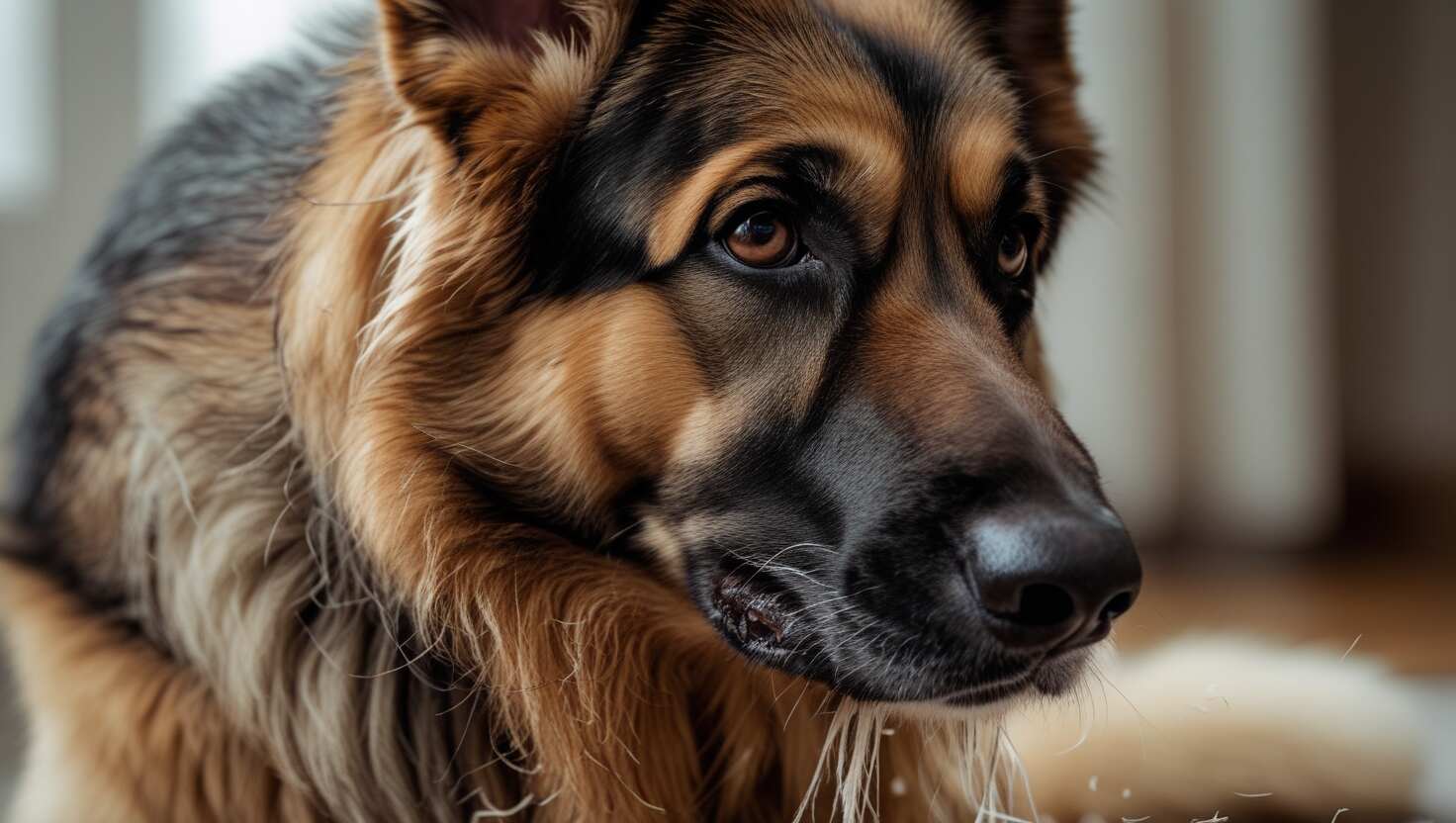Do German Shepherds Shed?
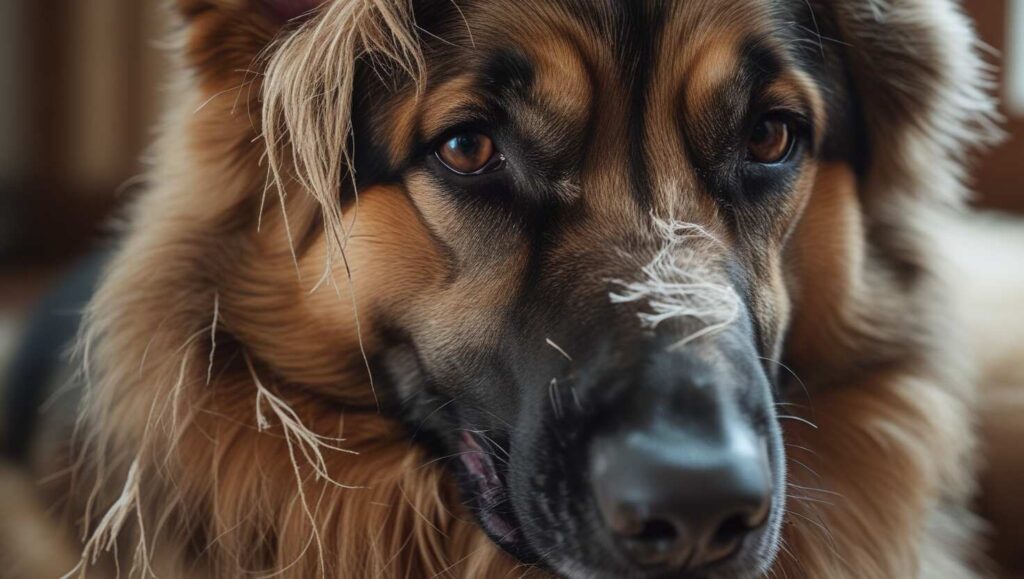
Yes, German Shepherds shed year-round, with heavy seasonal shedding in spring and fall. Regular grooming, a balanced diet, and stress management help control fur loss. Investing in proper tools and care ensures a healthy coat and a cleaner home.
Understanding German Shepherd Shedding
Basics of German Shepherd Shedding
German Shepherd dogs have a double coat made up of dense layers—a thick undercoat and a topcoat that offers protection from sunlight, heat, cold, and debris. Their fur is water-resistant and acts as insulation, helping with temperature regulation across all seasons. Unlike non-shedding breeds like the Shepadoodle (a Poodle mix), German Shepherds shed year-round, with seasonal blowing cycles in spring and fall for coat renewal.
This shedding process depends on climate exposure, breed variation, and adaptation. Some have short, medium, or long coats, with textures ranging from wiry and coarse to soft and wool-like. Regular brushing and grooming are essential to manage damaged or intact fur, preventing excessive shedding. Without proper care, they may experience stress, allergies, or parasite issues like fleas and ticks, requiring medication or a vet consultation.
A well-balanced diet, hygiene habits, and exercise routine help maintain their coat health. These guard dogs thrive in outdoors environments but may shed more due to lifestyle changes, hormonal shifts, or environmental rejection. Their compatibility with owners depends on their ability to handle fur management, as shedding is a natural part of the German Shepherd’s life cycle.
Shedding Phases and Seasonal Changes
German Shepherds are known as German Shedders because their coats shed year-round, with massive blow-outs in spring and fall. As daylight gets shorter in winter and longer in summer, their undercoat adapts to the climate zone. The shedding season lasts about 20 days, helping them adjust to seasonal changes based on their genes and country.
Proper home management requires patience and determination. Owners can anticipate and reduce shedding by brushing regularly and keeping their dog’s skin healthy. If hair loss leads to bald patches, red, itchy, or dry skin, wounds, secretions, or excessive scratching, it could be due to abnormal conditions.
These symptoms may indicate a need for a vet appointment to ensure the dog’s well-being. Regular care keeps them safe and comfortable, preventing extreme shedding problems.
Health Problems That Cause Too Much Shedding
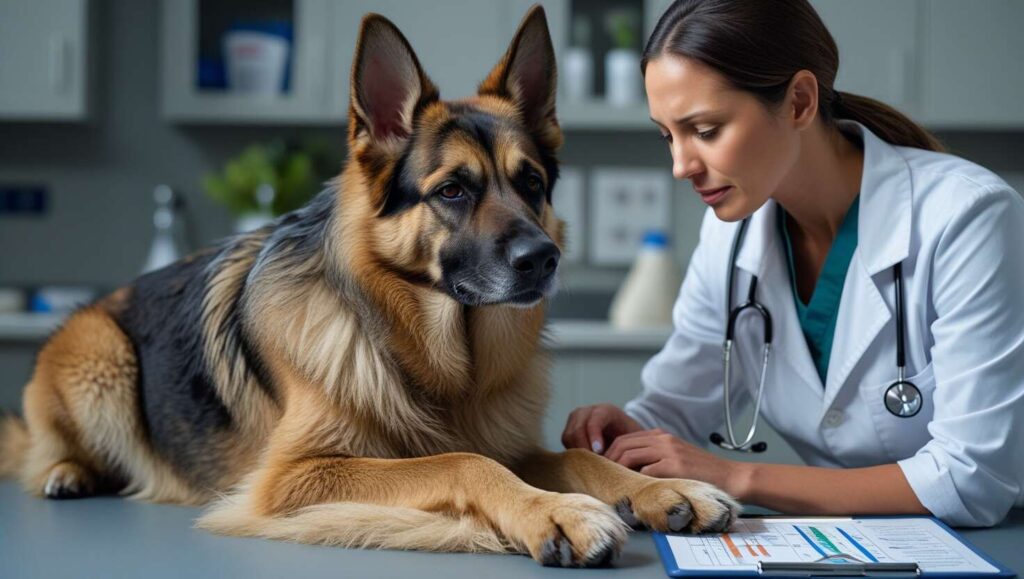
German Shepherds and Allergies
German Shepherds can develop food and environmental allergies from pollen, dust, or flea bites. These cause irritation, redness, hot spots, excessive licking, biting, and scratching. Flea allergies are common and lead to skin problems if not treated.
German Shepherds and Parasitic Infections
Tiny parasites like fleas, ticks, and mites can make your German Shepherd itch constantly. These pests cause hair loss, irritated skin, and discomfort. Regular grooming and veterinary consultation help keep them under control.
German Shepherds and Fungal Infections
Ringworm is a common fungal infection that causes circular patches of crusty hair loss in German Shepherds. It spreads easily, so early diagnosis and topical treatments are important.
German Shepherds and Hormonal Imbalances
A thyroid issue like hypothyroidism can lead to lethargy, weight gain, and poor coat quality in German Shepherds. A blood test diagnosis helps determine if medications are needed.
German Shepherds and Poor Nutrition
A balanced diet rich in proteins, fatty acids, and nutrients keeps a German Shepherd’s fur healthy. Lack of proper nutrition can make their coat thinner and weak.
German Shepherds and Stress-Related Shedding
German Shepherds with psychogenic alopecia often chew or pull their fur due to stress or anxiety. Regular activity and care help manage their emotional health.
German Shepherds and Skin Diseases
Conditions like dermatitis cause flaky, irritated skin and dandruff in German Shepherds. Proper grooming and topical care prevent discomfort.
German Shepherds and Autoimmune Diseases
Certain autoimmune disorders trigger bald spots and lesions, requiring immediate veterinary consultation for German Shepherds.
German Shepherds and Cancer-Related Shedding
Some cancerous tumors can lead to unexpected hair loss and skin changes in German Shepherds. A check-up helps catch problems early.
German Shepherds and Shedding Due to Old Age
As German Shepherds get older, their coat becomes thinner and sparser. Regular medications and care keep senior dogs comfortable.
Ruling Out Health Issues in German Shepherds
If your German Shepherd pup shows sudden shedding, energy loss, or unusual symptoms, visit a vet for a diagnosis and treatment plan.
Managing and Reducing Shedding
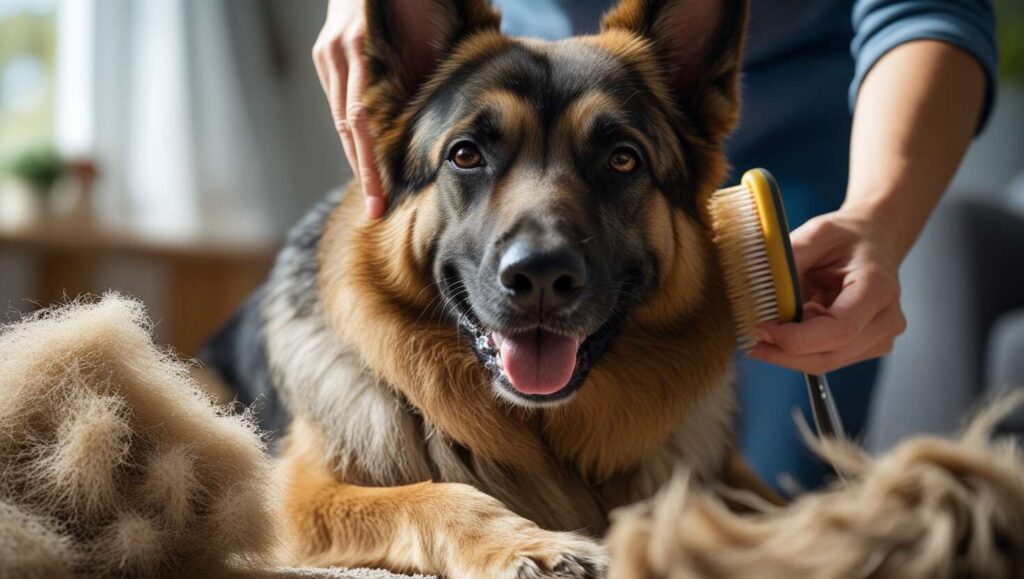
Brushing and Shedding Control
German Shepherds shed year-round, but regular brushing helps keep fur under control. Brushing daily for a few minutes removes loose undercoat, preventing fur from spreading around your home. A Pro Tip is to use the right tools, like an undercoat rake and slicker brush, designed for double-coated dogs. Brushing twice a week prevents tangling and matting, keeping the coat healthy.
Proper Grooming Techniques
Always brush in the direction of hair growth to avoid topcoat damage. A rubber mitt helps lift dead flakes and fur, while a wet mitt works like magic for picking up excess hair. Using a quality conditioner after bathing keeps the coat clean and smooth. Deshedding shampoo and conditioner can help loosen fur, making brushing more effective.
Efficient Drying Methods
For drying, K9 Dryers or a high-velocity dryer quickly remove loose hair, reducing drying time and effort. While bathing is beneficial, excessive washing strips natural oils, leading to dryness. A professional grooming trip every few weeks ensures deep fur removal and hygiene care.
Professional Grooming Services
Professional groomers use essential tools to improve efficiency and prevent unwanted shedding. A mobile service is a great option for busy owners, offering peace of mind. Keeping up with trims, nail care, and occasional professional brushing helps maintain a healthy coat.
Additional Shedding Solutions
If shedding concerns persist, addressing diet, hydration, and overall health is crucial. Investing in helpful tools and following the right grooming routine saves time and money, keeping your German Shepherd’s coat in top condition.
Essential Grooming Care
Regular grooming is key to reducing excessive shedding. Brushing removes tangles and loose fur, preventing worse shedding. Applying an anti-shed leave-in conditioner helps nourish and strengthen roots, improving fur health.
Maintaining a Hygienic Environment
Keeping beddings cleaned, toys, and bowls washed thoroughly ensures sanitary surroundings. This helps prevent parasites like ticks and fleas, reducing health problems. Watching grooming video guides such as Rover’s Makeover can help perfect the bathroom routine.
Proper Nutrition for Shedding Control
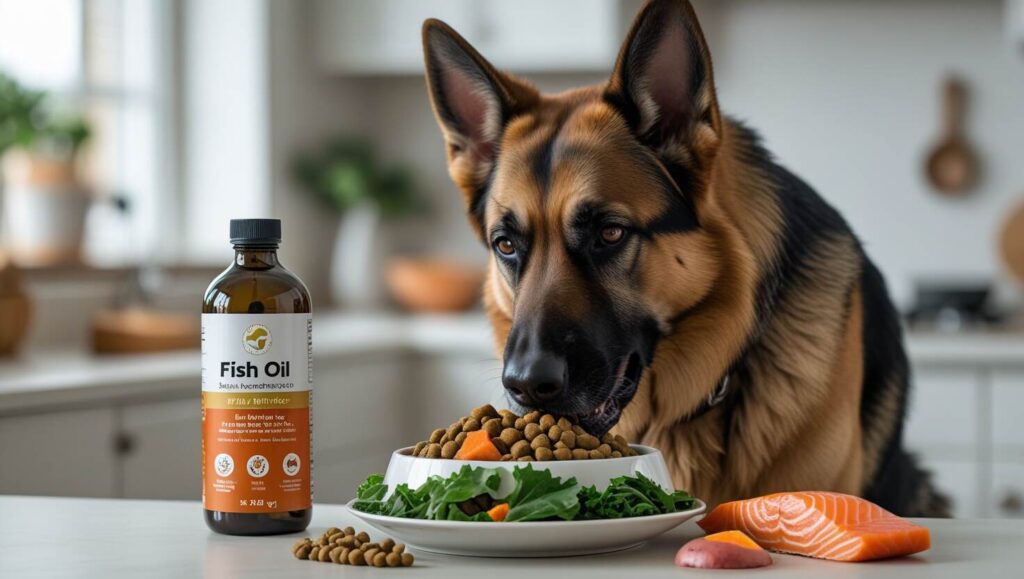
Essential Nutrients for a Healthy Coat
German Shepherds need a balanced diet rich in omega-3 and omega-6 fatty acids to support healthy skin and a shiny coat. A well-balanced diet strengthens the immune system, preventing illnesses that may worsen shedding. Adding fish oil supplements with DHA and EPA helps control shedding by nourishing the fur. Vets recommend high-protein diets with essential vitamins, minerals, and antioxidants to keep the coat strong.
Superfoods and Supplements
Feeding liver, sweet potato, cod, and carob boosts coat health with antioxidants. Special products like Synergy Labs Shed-X contain biotin, inositol, vitamin E, vitamin A, and vitamin D, promoting stronger fur. Dogs experiencing hormone changes, pregnancy, medications, or excessive shedding may need extra nutrition support.
Hydration and Coat Care
Proper hydration is essential. Dogs need daily water intake in ounces or liters to prevent dehydration, which can lead to fur loss. Oils like coconut, jojoba, safflower, and sunflower provide moisture, while a hydration spray or conditioner keeps the coat soft.
Preventing Health-Related Shedding
Underlying issues like Cushing’s syndrome, diabetes, kidney failure, liver disease, sunburn, flea and tick infestations, mange, dermatitis, infections, bacteria, and chemicals can trigger excessive shedding. A hypoallergenic food diet helps dogs with allergies, while regular brushing with a rake prevents hot spots and irritants from damaging the coat.
Environmental and Lifestyle Factors
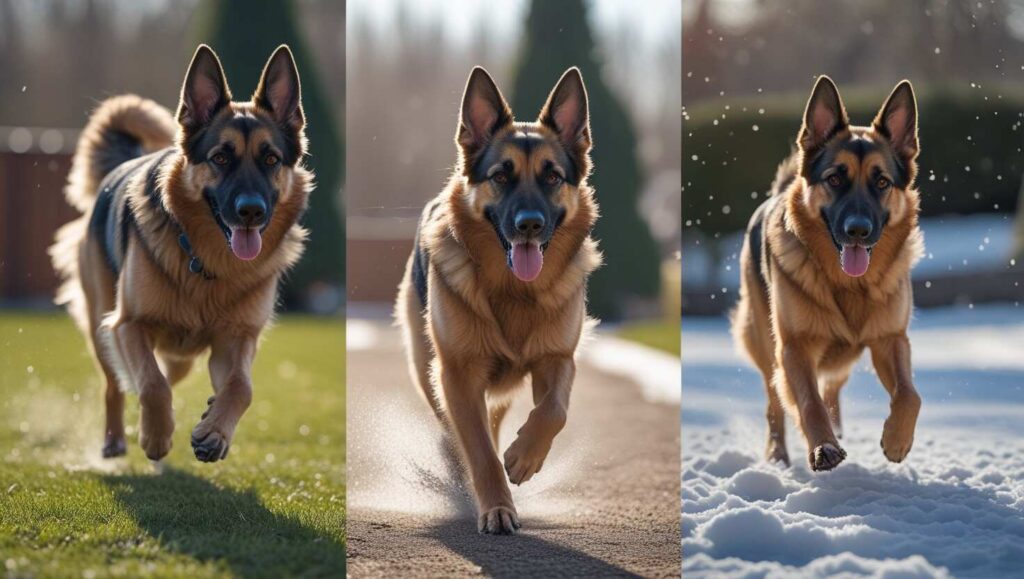
Home Care for Shedding Control
To reduce fur buildup, invest in the right tools like a high-quality vacuum with a pet hair attachment. This makes cleaning easier, especially on carpets and sofas. Using lint rollers and furniture covers helps remove pet hair quickly, keeping surfaces tidy while managing how much German Shepherds shed.
Keeping the house cool prevents hot environments that trigger considerably more shedding. Regular grooming, combined with proper home care, ensures a cleaner space and helps control loose fur effectively.
Managing Stress and Activity for a Healthier Coat
A happy dog sheds less and maintains a shiny coat. Regular physical activity, like a German Shepherd running, keeps their bright-haired fur healthy while reducing stress and excessive shedding. Exercise also supports overall health and prevents stress-related fur loss.
Signs of Stress in German Shepherds
Watch for these behavior signals that may indicate stress:
- Whining, whimpering, or avoiding eye contact
- Trembling, pacing, hiding, or escaping
- Dilated pupils, panting, or tucking the tail
- Urinating, defecating, or expressing anal glands
- Destructive displacement behaviors like excessive licking
Ways to Reduce Stress
To keep your dog calm and reduce shedding, try:
- Massage and physical contact
- Daily exercise and playtime
- Music therapy or a time-out routine
- Calming coats or t-shirts as an alternative comfort method
If stress continues, consider seeking professional help to ensure your German Shepherd remains healthy and stress-free.
Is a German Shepherd the Right Breed for You?
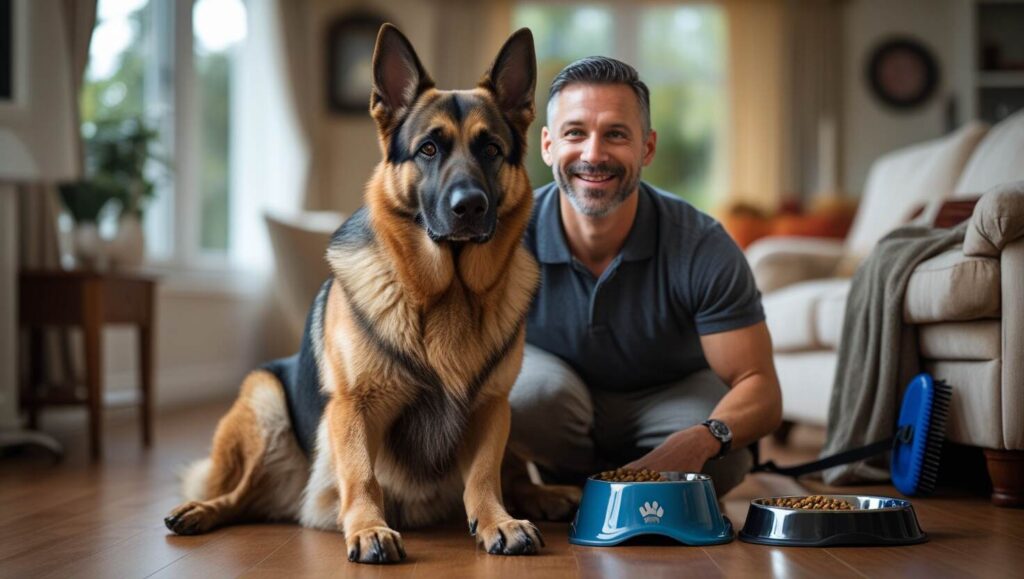
Owning a German Shepherd is rewarding but requires effort, especially when managing shedding. If you’re reconsidering this breed, be prepared for:
- Daily brushing to maintain a healthy coat and reduce stray hair
- Vacuuming frequently to manage fur around the home
- Grooming routine to control loose undercoat, especially in cold seasons
Why German Shepherds Are a Great Choice
Despite their shedding, they offer many rewards:
- A loyal, loving companion that bonds with the family
- Smart, trainable, and a natural protector
- Their charm makes the extra care worth it
Related Article : Are German Shepherds Good in the Home?
Managing Shedding Effectively
To minimize fur mess and control shedding, try:
- Occasional baths and professional services to maintain their skin health
- A high-quality diet to support their coat and hormonal balance
- Spay or neuter, as hormonal changes impact the shedding process
- Consistent cleanups and spending a few minutes daily on brushing
If you’re embracing this natural process, a German Shepherd is a great fit. They are not hypoallergenic, but with commitment and the right tips, an owner can minimize shedding and enjoy a happy, healthy dog.
Kindly note: The content shared in this blog is gathered from online sources, some of which may not be verified. For accurate guidance on caring for your dog, it is recommended to seek advice from a qualified veterinarian.
Frequently Asked Questions
How much do German Shepherds shed?
German Shepherds are double-coated dogs that shed year-round, with heavy shedding during summer and winter. Their topcoat and undercoat go through a blow twice a year when they adjust to changing temperature and sunlight.
How can I control fur in my home?
Regular grooming helps reduce loose hair. Using a rake, deshedding shampoo, and conditioner makes fur removal easier. A high-velocity dryer like K9 is essential for drying and reducing dead hair after baths.
What are the best grooming tools?
A single-motor or twin-motor dryer boosts performance. Deshedding tools, rakes, and removal brushes help manage a thick, shiny coat and prevent painful irritation and scratching.
Are German Shepherds a good choice for every dog lover?
They are loyal, brave, prolific, and highly trained dogs. While shedding can be daunting, proper practice and a healthy diet in the right environment help minimize discomfort and keep your dog happy.

